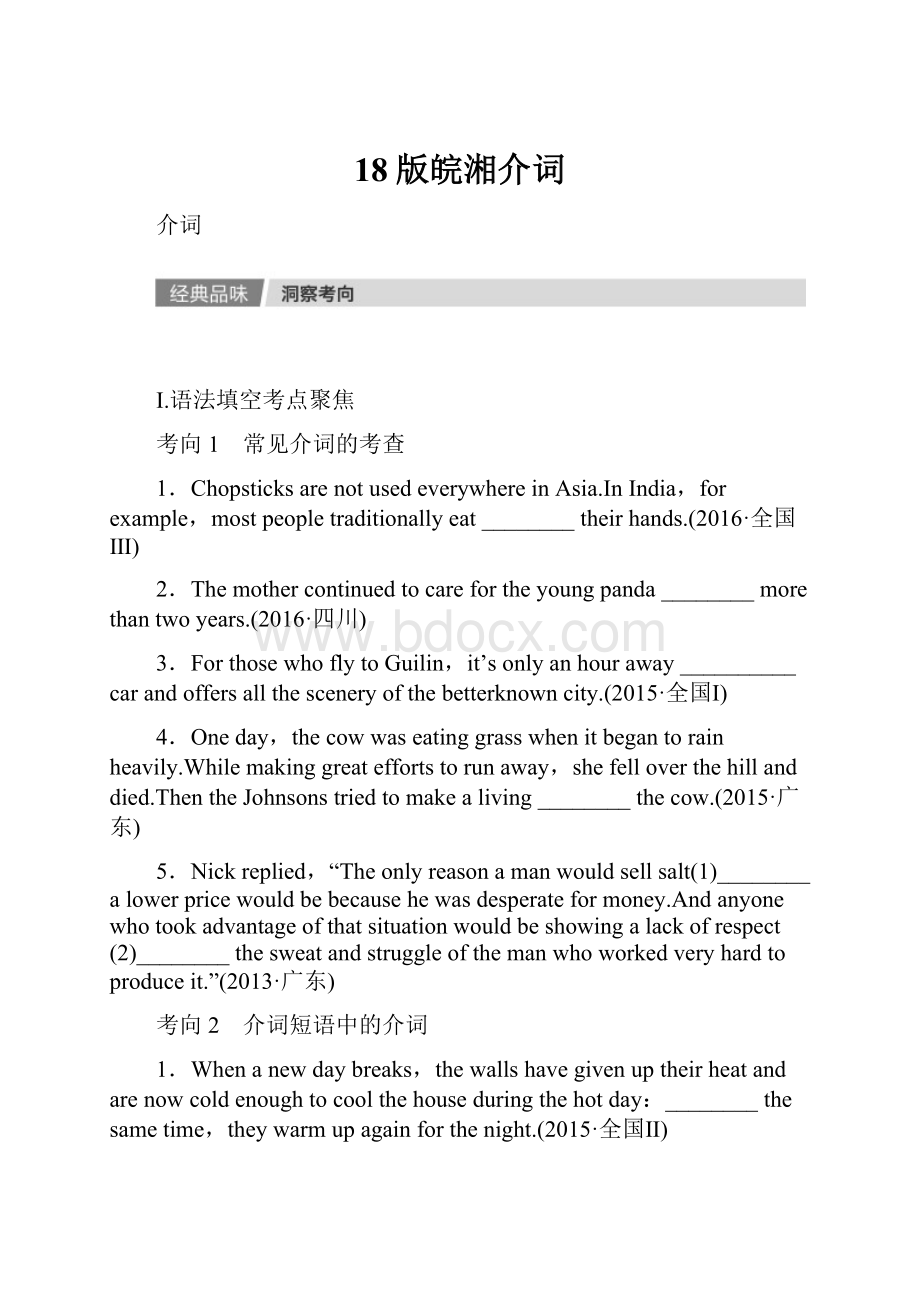18版皖湘介词.docx
《18版皖湘介词.docx》由会员分享,可在线阅读,更多相关《18版皖湘介词.docx(19页珍藏版)》请在冰豆网上搜索。

18版皖湘介词
介词
Ⅰ.语法填空考点聚焦
考向1 常见介词的考查
1.ChopsticksarenotusedeverywhereinAsia.InIndia,forexample,mostpeopletraditionallyeat________theirhands.(2016·全国Ⅲ)
2.Themothercontinuedtocarefortheyoungpanda________morethantwoyears.(2016·四川)
3.ForthosewhoflytoGuilin,it’sonlyanhouraway__________carandoffersallthesceneryofthebetter�knowncity.(2015·全国Ⅰ)
4.Oneday,thecowwaseatinggrasswhenitbegantorainheavily.Whilemakinggreateffortstorunaway,shefelloverthehillanddied.ThentheJohnsonstriedtomakealiving________thecow.(2015·广东)
5.Nickreplied,“Theonlyreasonamanwouldsellsalt
(1)________alowerpricewouldbebecausehewasdesperateformoney.Andanyonewhotookadvantageofthatsituationwouldbeshowingalackofrespect
(2)________thesweatandstruggleofthemanwhoworkedveryhardtoproduceit.”(2013·广东)
考向2 介词短语中的介词
1.Whenanewdaybreaks,thewallshavegivenuptheirheatandarenowcoldenoughtocoolthehouseduringthehotday:
________thesametime,theywarmupagainforthenight.(2015·全国Ⅱ)
2.Whenthebusfinallycame,weallhurriedonboard.Igotaplacenext________thewindow,soIhadagoodviewofthesidewalk.(2014·新课标全国Ⅱ)
考向3 动词短语中的介词
1.Butmyconnectionwithpandasgoesback________mydaysonaTVshowinthemid�1980s...(2016·全国Ⅰ)
2.Mostofusaremorefocused________ourtasksinthemorningthanwearelaterintheday.(2016·全国Ⅱ)
3.Hesoldorexchangedsomeofthemilkinthetownsnearby________otherfoodandmadecheeseandbutterforthefamilywithwhatwasleft.(2015·广东)
4.Peter:
OK.Don’tlaugh________me.Imaylookfunny.(2014·辽宁)
5.Ididn’tunderstandwhythiswouldhappenandmycreditcardhadalreadybeencharged________thereservation.(2014·广东)
Ⅱ.短文改错考点聚焦(每小题1处错误)
考向1 介词的遗漏
1.Myunclesaysthatheneverdreamsbecomingrichinashortperiodoftime.(2016·全国Ⅰ)
2.Wecanlieonthegrassforarest,orsitbythelakelisteningmusic.(2014·新课标全国Ⅱ)
3.Weappreciateyourapologiesandgoodwill,butwehopethatyoucanfigureagoodwayofsettlingthematter.(2014·辽宁)
4.Ifyouhearthealarm,standinlineatthedoorandwaityourteachertoleadyououtside.(2014·四川)
5.Theneveryoneinthecarriagebegansearchingtheticket,whichwaseventuallyfoundunderaseatseveralrowsfromitsowner.(2014·浙江)
考向2 介词的误用
1.Whiletheychatted,myfatherwouldliftmysisterandmeuptositinthetopofthefridge.(2016·浙江)
2.Unfortunately,onthedevelopmentofindustrialization,theenvironmenthasbeenpolluted.(2015·全国Ⅰ)
3.Oneday,littleTonywenttoashoppingcenterwithhisparents.Itwasverycrowded.Tonysawatoyonashopwindow.(2015·全国Ⅱ)
4.Myoldclassroomwasinterestingbecausethreesidesoftheclassroomweremadefromglass.(2015·浙江)
考向3 介词的多用
1.Dadcleanedthehouse,andthenwentonshopping.(2016·四川)
2.Mysoccercoachretiredinlastweek.(2015·陕西)
3.Pleasehelpwithmeandgivemesomeadvice.(2015·四川)
◆介词的句法功能
1.介词不能单独使用,但“介词+宾语”构成的介词短语可在句中作状语、定语、表语、宾语补足语、主语补足语等。
2.介词后的宾语可以是名词、代词、动名词、疑问词+不定式、wh从句等。
◆介词的核心考点
介词是虚词,不能单独作句子成分,必须与名词、代词(或相当于名词的其他词类、短语或从句等)构成介词短语,在句中充当一个成分。
介词分为:
简单介词,如at,in,for等;合成介词,如within,inside,onto,throughout等;短语介词,如accordingto,outof,becauseof,bymeansof,inspiteof,insteadof等;双重介词,如frombehind/above/under等;分词介词,如considering,including,judging(from/by)等。
1.介词搭配
(1)“动词+介词”搭配:
注意特定搭配与同一介词与多个动词搭配意义不同的情况。
①robsb.ofsth./cleartheroadofsnow(表示“夺去,除去”意义的动词与of连用)
②supplyuswithfood/filltheglasswithwine(表示“供给”意义的动词与with连用)
③makeadeskofwood/makebreadfromflour/makethematerialintoacoat(表示“制作,制造”意义的动词与of,from,into连用)
④“介词+the+部位”与动词的关系(=动词+sb.’s+部位,可换用)
strikehimonthehead(表示“击;拍;碰;摸”意义的动词与on连用)
catchhimbythearm(表示“抓;拉;拿;扯”意义的动词与by连用)
hittheboyintheface(表示“肚;胸;眼;脸”等人体前部的器官名词与in连用)
⑤prevent(stop,keep)sb.fromdoingsth.(表示“阻止,禁止”意义的动词与from连用)
⑥persuade(advise,warn)sb.intodoingsth.(表示“说服;建议;警告”意义的动词与into连用)
⑦buy(leave,get,win,gain,lose)sth.forsb.(表示“得失”意义的动词与for连用)
⑧tell(show,teach,sing,write,read)sth.tosb.(表示“告知”意义的动词与to连用)
⑨give(allow,promise,pass,hand)sth.tosb.(表示“授予”意义的动词与to连用)
注意:
⑦⑧⑨可换成buysb.sth.,tellsb.sth.,givesb.sth.双宾结构。
⑩saytosb.(suggest,explain,apologize,murmur,whisper等与“对象”连用必须用to)不可说suggestsb.sth.。
(2)同一介词与不同动词搭配,意义各异。
replytotheletter回信,sing/dancetothemusic和着音乐唱/跳,amountto达到,加起来有……,devoteto把……贡献给,drinkto为……干杯,objectto反对,lookforwardto渴望,cometo苏醒,belongto属于,searchfor搜……,askfor请求,use...for把……用作,leavefor前往……,take...for把……误以为,callfor要求,waitfor等待,carefor喜欢,makeupfor弥补,turnto求助/救于,helponeselfto随意,agreeto同意,compare...to把……比作,sendfor派人去请/拿……,sailfor驶向,起航,setoutfor动身去,goinfor爱好……
(3)常见的“形容词+介词”搭配。
worthyof值得的,befarfrom离……远,begratefultosb.forsth.为某事感激某人,befreefrom没有……/免除……,beproudof/takepridein为……自豪,besatisfiedwith/by对……满意,besureof/about确信,befondof喜欢,befitfor适合,bebusywithsth./indoingsth.忙着做某事,befullof充满,bereadyfor准备,besimilarto与……相似
(4)“名词+介词”习惯搭配和意义区分。
theabsenceofwater缺水
thehopeofsuccess成功的希望
haveachanceof/forenteringcollege上大学的机会
takeprideinthem为他们感到骄傲
thekeytothequestion问题的答案
amedicineforcough治咳嗽的药
theticketfortomorrow明天的票
hisabsence
theway
2.核心介词用法归纳与辨析
(1)表示时间的介词in的用法如下。
表示在某一较长时间内,如世纪、年、季、月、周等,一般用介词in,如:
inthe1990s,intheyear,inJanuary,in(the)winter/summer/fall/spring,inthefirstweekofMay。
还可以用时段名词组成固定短语或词组。
如:
inawhile,innotime,inthedaytime,inashortwhile,intime,inthemorning(afternoon,evening)。
注意:
①atnight/atnoon,intheday(在白天),inthenight(在夜间)。
②infivedays(weeks,months,years)中in意为“在……以后”。
(2)在具体的某一天或某天上午、晚上、前夕,常用on。
onSunday(s),onTuesdaymorning
onChristmasDay(但atChristmas),onChristmasEve,onChildren’sDay
onMarch8,onthemorning(afternoon,evening)ofOct.1
earlyonthemorningofOct.1(区别:
inthelate/earlymorningofOct.1)
onarainynight,onwarmwinterdays
(3)表示某一时刻或某一时间点用at,如小时、分钟等。
atbreakfast(supper,lunch),atsix
atnoon(sunrise,sunset,midday,night,midnight,dawn)
attheageof15,atthetimeofwar(但intimeofdanger/trouble)
注意:
①有些时间名词前不接介词,如nextday,lastSunday,thatmorning,theseyears。
②one,each,any,every,some,all修饰时间名词时,一般不用介词,如someday,oneday,allafternoon。
(4)till,until的用法。
till(until)与持续动词连用一般用于肯定句中,与短暂动词连用一般用在否定句中。
Hewaitedformetilltwelveo’clock.
Hedidn’tgetuptill(until)10a.m.
注意:
在句首出现或强调句型中一般不用till而用until。
Notuntil9a.m.didMr.Smithcomebacktoschool.
(5)in,later,after的用法。
①in+一段时间:
表示说话时为起点的一段时间之后,与一般将来时连用;但表示“在……之内”时,用于各种时态。
②一段时间+later(later是副词):
表示某一具体时间或某一方面具体时间算起的一段时间后。
③after+一段时间:
表示“在……之后”,用于一般过去时;但时间为点时间时,只能用after,即after+点时间,用于各种时态。
Thedoctorwillbewithusinsixminutes.
Shegraduatedin1981,andeightyearslatershebecamethemanagerofthefactory.
Hereceivedherletterafterfourweeks.
另外,in+一段时间+’s+time与within+一段时间的用法如下:
inaweek’stime=inaweek
Theywillarriveinthreedays’time.(与将来时连用)
Mybrother’sbirthdayisintwoweeks’time.(作表语)
I’llfinishthebookwithintwoweeks.(within=inlessthan...用于各种时态,意为“不超出,在……之内”)
(6)地点介词at,on,in,to,off,across,through,over,above,under,below。
①at在较小的场所,in在较大的场所,on在……的平面上。
如attheairport,atthestation,at55ParkStreet,inChina,inthenorth,inAsia,onthedesk,onthewall等。
②on,at,in,off还可以表示两地的相对位置。
若A地属于B地,用in;A地位于B地的外面且有边缘衔接,用on;无边缘的衔接,用to;A在B附近,用off。
JapanliestotheeastofChina.(范围之外)
TaiwanliesinthesoutheastofChina.(范围之内)
HunanProvinceliesonthewestofHubeiProvince.(毗邻)
TheislandliesoffthecoastofChina.(相隔一定距离)
③across在物体表面“穿过”;through则表示在三维空间内部“穿过”。
Theywalkedacrosstheplayground.
Iwalkedthroughtheforest.
④over,above译作“在……之上”;under,below译作“在……的下面”,其区别在于over,under表示一种直接的、垂直的上下关系;而above,below则表示一般的“高于”或“低于”,不一定是垂直“在上”或“在下”。
Alittleboatisnowunderthebridge.
Thereisabridgeovertheriver.
Thesunsinksbelowthehorizon(地平线).
Thewindowiswellabovethetree.
(7)表示方式、手段、工具的介词。
①bytheyear/hour/day按年/小时/天。
如:
Herentsahousebytheyear(day,hour).(但tothepound按磅算,totheton按吨计)。
②表泛指的方式、手段
bypost/mail邮寄,bytelephone(radio)(但onthephone/ontheradio/onTV),byelectricity用电,bymachinery用电器,byhardwork,learnsth.byheart,throughthesatellite,throughpractice,throughhisownefforts,throughexperience,throughthetelescope
交通工具类
bybus/train/car/taxi
bybike/bicycle,onhorseback/foot
byplane/jet/spaceship/air
byship/boat/lifeboat/sea/water
另外:
bymeansof用……方法;bywayof经由,取道于,用……方法;withthehelp(permission)ofsb./withsb.’shelp(permission)在某人的帮助(许可)下。
③表方式、手段的其他用法
Hebeatthedogwithastick.(with+工具/器械)
Onesmellswithhisnose.(with+人体器官,但byhand手工,用手)
Hestoodupwithpride.(with+情绪、情感、态度的名词)
注意:
使用语言、材料、文字等用in。
如:
inEnglish(ink,pencil)。
(8)表示“除……之外”的常用词。
①besides除……以外(还有)。
作副词时意为“而且,更何况”。
Therewillbefiveofusfordinner,besidesJohn.
Itwastoolatetoseeafilm,andbesides,Iwastired.
②except除去,除……之外(不再有)。
WeallwentexceptJohn.
注意:
在否定句中,besides与except可以换用。
Hehasnootherhatsexcept/besidesthisone.
③exceptfor除了……(对句子主题进行细节校正或附加说明),后接名词、代词或what从句,此时与“exceptthat+句子”意思相同。
Hewasverycleverexceptforcarelessness.
④exceptthat...除了……一点以外。
Hehasnotchangedexceptthatheiswearingdarkglasses.
⑤but与except
but和except在表示“除了……以外”时可以通用,但应注意以下三点:
(A)前面有不定代词、疑问代词在意义上对称时,多用but。
Allbutonearehere.
NobodybutIlikesmakingmodelships.
(B)后接不定式短语为排除对象时,多用but。
Hehasnothingtodobutwait.(前有do,后省to)
(C)but与一些固定结构连用。
havenochoicebuttodosth.只得做某事,cannotbutdosth.不得不做某事,cannothelpbutdosth.不得不做某事,butfor...若不是……
(9)between与among
①between通常指两者之间,也可以用于三者或三者以上的每两者之间的相互关系。
AnnisbetweenTomandBill.
SwitzerlandliesbetweenFrance,Germany,AustraliaandItaly.
Theysoonfinishedtheworkbetweenthemselves.(共同,合作)
Shewasbusybetweencooking,washing,sewingandlookingafterthebaby.(表示接连不断地,一个接一个地忙这忙那)
Ahorsecanbeseenbetweentreesnow.
②among表示三者以上之间。
Thestoryissaid